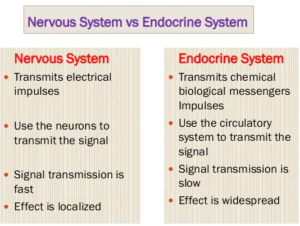Difference between Nervous System And Endocrine System

The nervous System And Endocrine System are the regulatory systems that enable the communication between tissues, organs, and cells. They are responsible for controlling and coordinating the signals transmitted to the body, internally or externally. These systems help to maintain homeostasis and other system activities.
The major difference between the nervous system and the endocrine system is that the nervous system uses electrical signals or impulses to send the signals through neurons. On the other hand, the endocrine system uses hormones acting as a chemical messenger to send signals to the target cell through the body. blood circulation in the body.
The basic role of both systems is regulated by the negative feedback mechanism. Hence, their mode of timing differ and transfers, chemical messengers play a significant role in both systems.
The Nervous system and endocrine are the two systems involved in coordinating body functions. Signals from the nervous system are transmitted within a very short time. while Signals from the endocrine system take longer to reach the effector organ because they are transmitted through the blood.
Nervous Vs. Endocrine Systems – Overview
we can say that the nervous system and endocrine systems play a vital role to give signals to internal parts of the body. Both systems use the source as the brain but in different ways. The nervous system responds fast and quickly to stimuli. On the other hand, the endocrine system sends the signals using the different pathways and slowly relative to the nervous system.
What is the Nervous System?
The nervous system responds to stimuli by sending the electrical signal along neurons, and then these electrical signals or action potentials are transmitted to target cells with the help of neurotransmitters. Neurotransmitters are the chemical messenger of the nervous system. The nervous system is the system of the main control body. The nervous system possesses nerve cells found in the brain. just like the nervous system, the spinal cord plays a vital role in transmitting signals. The spinal cord functions as the main pathway. The electrical signals are transmitted from the brain to other parts of the body.
Nervous system functions
The nervous system helps to make quick decisions and respond to several things. The nervous system also controls emotions. The nervous system all works thanks to the electrical signals that pass through the body from the brain. Nervous disorders may cause functional difficulties and lead to conditions such as epilepsy, Alzheimer’s disease, Parkinson’s disease, multiple sclerosis, Huntington’s disease, and other vascular disorders such as hemorrhage subarachnoid, transient ischemic attack, and stroke.
Read Also:
What is Endocrine System?
The complex network of glands that secrete chemicals in response to stimuli. Hence, the hormones in the body are called chemical messengers. It depends on hormones to evoke the response of target cells. The hormones of the endocrine system are secreted by the special glands near or far from their target cells. Then they gradually travel through the intercellular fluid or blood.
The process of this system takes a long time to respond, when hormones are first synthesized, then sent to the target cell, and then perform their function inside the cell. In simple words, they provide the signal to the cell of the target part, and the action remains for a long time.
Endocrine system Organs
In the body, the total glands are part of the endocrine system. They include the hypothalamus, pituitary, thyroids and parathyroid glands, pineal gland and pituitary glands are some organs of the endocrine systems, present in the head part of the body. The kidneys and pancreas are found in the stomach, whereas the testes and ovaries are found in the abdominal part of the body.
Endocrine System Functions
It maintains the functions of organs. The glands help to regulate homeostasis. E.g. The hormone growth secreted by the pituitary gland is responsible for the body’s growth generally during childhood while the heartbeat, respiration, cell metabolism is also maintained simultaneously.
Similarities Between Nervous system and Endocrine system:
- The nervous system and endocrine system coordinate the functions of the body by responding to stimuli.
- Both systems maintain the body’s homeostasis.
- Both send signals to the effector organ.
- Both use chemicals to send the signal transmission.
Related Links in our site:


